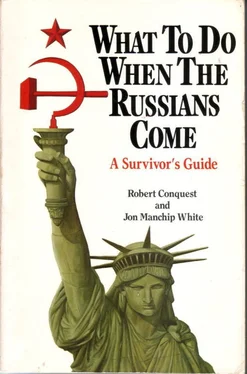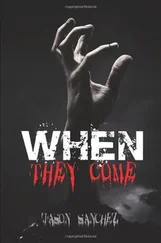Robert Conquest - What to Do When the Russians Come
Здесь есть возможность читать онлайн «Robert Conquest - What to Do When the Russians Come» весь текст электронной книги совершенно бесплатно (целиком полную версию без сокращений). В некоторых случаях можно слушать аудио, скачать через торрент в формате fb2 и присутствует краткое содержание. Город: New York, Год выпуска: 1984, ISBN: 1984, Издательство: Stein and Day Inc., Жанр: Публицистика, на английском языке. Описание произведения, (предисловие) а так же отзывы посетителей доступны на портале библиотеки ЛибКат.
- Название:What to Do When the Russians Come
- Автор:
- Издательство:Stein and Day Inc.
- Жанр:
- Год:1984
- Город:New York
- ISBN:0-8128-2985-9
- Рейтинг книги:3 / 5. Голосов: 1
-
Избранное:Добавить в избранное
- Отзывы:
-
Ваша оценка:
- 60
- 1
- 2
- 3
- 4
- 5
What to Do When the Russians Come: краткое содержание, описание и аннотация
Предлагаем к чтению аннотацию, описание, краткое содержание или предисловие (зависит от того, что написал сам автор книги «What to Do When the Russians Come»). Если вы не нашли необходимую информацию о книге — напишите в комментариях, мы постараемся отыскать её.
What to Do When the Russians Come — читать онлайн бесплатно полную книгу (весь текст) целиком
Ниже представлен текст книги, разбитый по страницам. Система сохранения места последней прочитанной страницы, позволяет с удобством читать онлайн бесплатно книгу «What to Do When the Russians Come», без необходимости каждый раз заново искать на чём Вы остановились. Поставьте закладку, и сможете в любой момент перейти на страницу, на которой закончили чтение.
Интервал:
Закладка:
A good set of ladders (padlocked) will be useful as well as several sheets of glass. It is demoralizing to have to live in a house whose windows are broken or boarded up with plywood or cardboard, and being able to mend your smashed windows will give you a small psychological lift. On the other hand, it will not be advisable to paint the exterior of your house or lavish too much care and attention on it. See that it is sound-and-water-proof, but otherwise foster a discreet shabbiness. You won’t want your house to stand out. Begin to cultivate early the art of keeping a low profile.
There will be work enough inside the house to keep you going. You will have endless trouble with your plumbing. In general, we would strongly urge both men and women to become do-it-yourself experts. Develop, as far as possible, any skills you may have in the fields of maintenance and repair. This will not only be useful at home but marketable in the world outside. It could provide you with a small steady income and serve as one of the other jobs that you will have to do if you are to make ends meet. Except for the elite, plumbers, carpenters, and electricians will be hard to come by. (Such skills may also save your life if you land in a labor camp.) Try to obtain a sewing machine—hand or foot, not electrically, operated. You will then be equipped, at some time in the future, to earn extra money for the family as a seamstress, dressmaker, or even an upholsterer.
There are many automobiles in America. Few will be left in “private” hands, except for those allocated to the Party and the Russians. Most will be pulled into car pools run by the offices and enterprises; here too, the more privileged people will have first choice. (There will be a limited number of jobs as drivers in both these categories, and you may be able to get one. However, in spite of advantages such as occasional tips or food from the Party bosses, you may prefer not to have your life disrupted by irregular hours, to say nothing of the risk of failing to keep the car in good repair for want of spare parts and facing a charge of sabotage.) But in any case, the shortage of gasoline will drive the majority of cars off the road, and unless you can get a special ration, as may be possible for distant farmers, you are unlikely to be able to use your own car, even if you can keep it.
Mobile caravans will be confiscated, unless you must live in yours yourself if your home is appropriated or destroyed. Yachts and powerboats will be compulsorily laid up or put out of action. If you possess a seagoing vessel you might, of course, think about using it while you can, during or immediately after the cessation of hostilities, to try to make a run for freedom. Such a course of action obviously requires a good deal of reflection and planning.
The preferred, indeed almost the only, mode of private transport will be the bicycle. You might like to be prepared by buying yourself and the other members of your family good sturdy no-nonsense vehicles while the supply is still plentiful and while you can lay in a stock of tires and accessories. Don’t buy bicycles that are too flimsy and too flashy and that are likely to attract disapproving or dishonest eyes. Paint the chrome gray or black or otherwise dull it over. Get a strong padlock. You may find that you have to bicycle a long way to your place of work and back, with perhaps a good many hills and obstacles besides; but except in bad weather, you might find that this acts as something of a tonic since it will enable you to work off the side effects of your often starchy diet while providing you with moderate exercise at the same time.
After some weeks, a public transport system in the form of buses, and eventually subways, will be reestablished, at least in a skeletal form. The railways will survive, probably burning coal since coal is plentiful in the United States and the mines (strikes being forbidden) will be one of the few industries working to full capacity. And it may be that you will become accustomed to seeing on the streets of America those weird and ingenious contraptions that circulated in Europe in World War II.

5. THE INDIVIDUAL BY PROFESSION, OPINION, AND HABIT
We have given you something of the general picture of what your life, as an American, will be like under Soviet rule—and we shall be giving you more in later chapters. But you will also be anxious to know how someone of your own particular professional and ethnic and political and tempermental background is likely to fare. In the pages that follow, we look into the special conditions facing a wide variety of these, of a reasonably representative nature, from Academic to Farmer, from Realtor to Industrial Worker, from Black to Student, from Homosexual to Feminist, from Soldier to Traitor.
Academic
When universities reopen after the crisis, student numbers will have gone down. Some will be dead, some in prison, some in the partisan movement.
Private, religious, and racially or ethnically oriented institutions will have been taken over by the State. All departments, but especially those of history, philosophy, political science, economics, and sociology, will be purged of “incorrect” teachers with great thoroughness. The curricula will be thinned down and streamlined along Russian lines, with the more controversial and enterprising elective courses omitted.
Colleges will be run by Communist-appointed functionaries, including representatives of the secret police, and there will be no “academic freedom.” If you are at the moment an academic with Communist or Marxist leanings, you can expect to become at least a dean or the head of your department, at least for as long as your orthodoxy is regarded as adequate. If you lack such credentials, you must make up your mind to tread warily and keep your mouth shut. Eschew the banter, gossip, and small talk that is normally the small change of academic life. Departmental infighting will cease to be a diversion and will become a blood-sport, the losers being consigned to the ranks of bricklayers, coal miners, and washroom attendants, if lucky. Sneaking and denunciation will be the order of the day, and since the arrest rate will be one of the highest in any field, you will be hard put to trust your colleagues, for you will not be able to tell which of them have become police informers, either of their own volition or through blackmail.
Similarly, take care not to make unguarded remarks to your students since one or more of the students in each of your classes will be stool pigeons or undercover “observers,” or starry-eyed members of the Party. Be generous with your grades since disgruntled students will denounce you, and if convenient, their complaints will be produced as hard evidence of your unreliability.
On the other hand, some professors may be relieved to find that the student body will otherwise become hardworking, respectful, and serious to the point of being subdued (see Student below). Campus protests will be a thing of the past.
You will find giving and attending Marxism-Leninism classes boring, but if you can manage to appear enthusiastic you will be rewarded accordingly. The hardest thing to which you will have to accustom yourself will be the distortion of your researches and of scholarship in general. Many of the books that you will need to consult will have been removed from the shelves of the library; and your own articles, theses, and books will be subject to State censorship. Publishing outlets will in any case be few and themselves under State control (see Publisher ). You will find it necessary to import Marxist-Leninist jargon into the most unlikely topics, and it will take you some years to acquire the ability that academics in the older Communist countries have developed of discounting the obligatory Party-line nonsense and reading between the lines. At first, the necessity of accepting and expressing ideas that are mendacious, silly, or downright crackpot will depress you; in time you may get used to it. (See also Schoolteacher; Scientist .)
Читать дальшеИнтервал:
Закладка:
Похожие книги на «What to Do When the Russians Come»
Представляем Вашему вниманию похожие книги на «What to Do When the Russians Come» списком для выбора. Мы отобрали схожую по названию и смыслу литературу в надежде предоставить читателям больше вариантов отыскать новые, интересные, ещё непрочитанные произведения.
Обсуждение, отзывы о книге «What to Do When the Russians Come» и просто собственные мнения читателей. Оставьте ваши комментарии, напишите, что Вы думаете о произведении, его смысле или главных героях. Укажите что конкретно понравилось, а что нет, и почему Вы так считаете.












